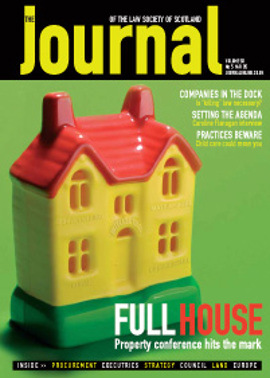Council life

Two years ago, when I saw a vacancy on Council of the Law Society of Scotland advertised in the Journal, I discussed the idea of applying with a few colleagues and friends. The overriding question was “Why would you want to join the Council?” It’s a question I’m still being asked. It has been said that the Society will take over your life if you let it. At the very least, it’s two full days a month, and it’s not chargeable time. Is it a commitment that either busy professionals or their employers can make?
The answer is “yes” on both counts. Here’s why.
As professionals we are (1) lawyers, (2) practice specialists and (3) employees or employers, working within the cultural identity of our organisation, be it in private practice or other. Becoming involved in Council benefits each of those aspects of your professional personality, and in this article I will attempt to explain how.
What is the commitment?
We know that Council members are our representatives within the Law Society of Scotland, charged with representing our interests on a monthly basis at regular Council meetings. A typical month’s papers, circulated in advance, take around an hour’s preparation to read (more or less depending on the month, or the agenda’s relevance to you and your constituents). Council meetings last between a half to one full day a month. Among many recent topics for debate have been the Clementi Review, education and training issues, MNPs, the findings of the Scottish Solicitors Disciplinary Tribunal, legal aid, and the annual conference. Further action is taken, as appropriate, by the Executive and the various committees.
Council members are asked to participate in at least two committees. For my part, I sit on one of the client relations committees, which determine client complaints about solicitors (I can recommend this as an excellent insight into practice and/or risk management); the Education and Training Committee, currently working on the perennial question of how to improve the links between the LLB, the Diploma, the traineeship and thereafter (CPD); and the Human Rights Committee, which meets on an ad hoc basis to discuss Society responses to topical issues such as the Identity Cards Bill (interrupted by the General Election).
Committees also take around a day a month, including preparation time, but the level of commitment here depends more on your involvement in the working parties created to deal with specific issues when they arise. This is entirely up to you, and can vary depending on your workload.
How does it help you as a lawyer?
When most of us decided to join the legal profession, we did so with ideals of truth, justice, integrity and honesty close to our hearts. These ideals are the basic tenets of our ethical code. Resolving the issues faced by our clients challenges us in new, increasingly subtle ways. Council is an excellent way of learning about resolutions and practices that you and your colleagues may not yet have encountered. The membership is deliberately varied, and you might encounter an in-house lawyer, a big firm lawyer, a legal aid lawyer and a university professor debating a practical problem over coffee. It is this exchange of ideas and cautionary tales that is one of the unspoken benefits of Council. Obviously, no confidentialities are breached in discussions!
More specifically, the Professional Practice Committee makes it its business to deal with topical queries from clients and the profession. Recently, the threat of “gazumping” in Scotland has received a lot of attention. Even as a litigator, I find it useful to be involved in these discussion forums to increase my understanding of the industry concerns.
How would it help you as a practice specialist?
Discussions on gazumping and the SDLT reforms are of particular interest for conveyancers. As a litigator, committees such as the Civil Practice Committee provide me with an opportunity for more practice-focused information. Aside from the intelligence gleaned from committees, Council gives practitioners a unique opportunity to meet lawyers in their practice field as well as the full array of legal occupations – academia to in-house, sole practitioners to multinational practices. It has been extremely useful to me, for example, to discuss the practical impact of recent changes to the Court of Session commercial cause rules with other litigators. It’s an opportunity to exchange ideas, and to get to know one another. In any practice area, there is an obvious benefit in building a network of contacts, not least for conflict referrals.
How would it help you within your organisation?
Finally, the least noble of the three benefits is self promotion(!). Whilst there are many good reasons to become more involved in the Society, it is fair to say that we are all either involved in running businesses that must turn a profit or working to a budget that we must justify. Council time is not chargeable time, so what is the benefit financially in terms of your business and to you by way of career progression?
In terms of personal gain, you may be the type of person who is striving for partnership, or someone who just wants a bit more variety in your career, a different perspective or a new lease of life. In either case, the personal benefits in mixing with a variety of lawyers from different backgrounds and extending your network are obvious.
Your firm hears about the upcoming changes while the issues are still hot and while your firm can still contribute. It hears about novel solutions to common problems. Firms can tell clients about their active participation in the Society, with topical facts and figures at their fingertips to interest their clients and counter clients’ concerns. Press coverage of the Clementi Review, for example, has been selective, and it has been useful to be able to provide accurate information on the impact that this has in Scotland (our clients have been particularly interested in the comments on multi-disciplinary practices). Your firm’s profile within the profession benefits from your raised profile.
Council work is a cocktail of business development and CPD. Not only does your firm benefit from the “intelligence” you gain from involvement with the Society, you get CPD credit for it. A fringe benefit you get is a free season ticket for the more formal CPD Society events – and your colleagues get a discount. You can make a stash of contacts, raising the general awareness of both you and your firm. As people get to know you better, you may even be asked by the Society to represent the profession to the outside world – as an international delegate or as a specialist in your field. Kim Leslie, Council member for Edinburgh and I represented “young Scottish solicitors” in an international conference in Beijing, China organised by the British Council (see April Journal, page 35).
In conclusion, there are many reasons to become more involved in Council, whatever your motivation. The level of time commitment has significantly reduced because of the recent review of the roles of the Executive, the Council and the various committees. The demographics of Council are changing to mirror those of the profession as a whole. I was co-opted to boost the representation on Council of younger lawyers, and hopefully my participation helps that aim. Council is very “inclusive” and I feel able to discuss and contribute on every level (I hope my fellow Council members would agree!). It isn’t just about altruism and career satisfaction, though – as with anything, it’s the people that make a task rewarding.
Suzanne Lyons is a senior solicitor at CMS Cameron McKenna LLP and a co-opted member of Council. e: suzie.lyons@cms-cmck.com
ELECTION OF MEMBERS OF COUNCIL 2005
I, Douglas Russell Mill, Secretary of the Law Society of Scotland, Returning Officer for the purpose of the election of members of the Council of the Society, hereby give notice that the undernoted persons were duly elected as members of the Council of the Society for the following constituencies:
Sheriff Court District of Aberdeen: Jane MacEachran, Aberdeen City Council, Broad Street, Aberdeen.
Sheriff Court District of Airdrie: Ian Smart, Ian S Smart & Co, 3 Annan House, Town Centre, Cumbernauld.
Sheriff Court District of Edinburgh: Robert Frazer, Drummond Miller, 32 Moray Place, Edinburgh; Ruthven Gemmell, Murray Beith Murray, 39 Castle Street, Edinburgh; Kim Leslie, Digby Brown, 7 Albyn Place, Edinburgh; Christine McLintock, McGrigors, Princes Exchange, 1 Earl Grey Street, Edinburgh; Scott Miller, Allan McDougall & Co, 3 Coates Crescent, Edinburgh; Duncan Murray, Morton Fraser, 30-31 Queen Street, Edinburgh; George Way, Beveridge & Kellas, 52 Leith Walk, Edinburgh.
Sheriff Court Districts of Dumfries, Kirkcudbright & Stranraer: Ranald Lindsay, Lindsay, 33 Buccleuch Street, Dumfries; Peter Matthews, A B & A Matthews, Bank of Scotland Buildings, Newton Stewart.
Sheriff Court Districts of Hamilton and Lanark: Oliver Adair, Adair & Bryden, 2 Church Street, Larkhall.
Sheriff Court Districts of Stonehaven, Peterhead & Banff: John MacKinnon, Brown & McRae, Anderson House, 9/11 Frithside Street, Fraserburgh.
There were also by-elections in the constituencies of Ayr, Dumbarton and Perth where the following members were elected as members of the Council of the Law Society of Scotland:
Sheriff Court District of Ayr: Ian Gardiner, The McKinstry Co, Queen’s Court House, 39 Sandgate, Ayr.
Sheriff Court District of Dumbarton: David Newton, The PRG Partnership, Kilbowie Road, Clydebank.
Sheriff Court District of Perth: Farhat Adams, A & R Robertson & Black WS, Bank Street, Blairgowrie.
Douglas R Mill, Secretary, 29 April 2005
In this issue
- Leaving on a high
- The JAB: why it isn't working
- One house, many rooms
- Bad company
- Tender and true
- Beware the pitfalls
- Alien investors in the US
- Budgeting and beyond
- Let's play tag
- Same old story
- Getting the message across
- Council life
- Should the party pay?
- Unintended effects?
- A fine Profile
- Public benefit?
- The appeal of leave
- When is a cost not an expense?
- Website reviews
- Book reviews
- What a waste!
- How safe are your titles?






